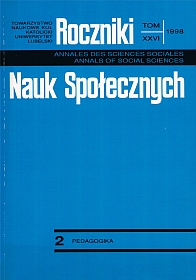Emancipation through Faithfulness to Perfection Woman in F. W. Foerster’s Pedagogy
Abstract
Emancipation, or else freeing from the conditions of the present world (for such is the understanding of the concept that I assume) according to Foerster’s proposals, takes place through the woman’s faithful persistence with ideals, traditions and customs protecting her good. This emancipation is carried out through her persistence with the highest values. This does not mean "compromise" with laziness, lack of responsibility, and egoism. It means, however, faithfulness to that which is perfect and which constitutes an authentic good.
References
Adamski F., Sytuacja społeczno-moralna rodziny u zarania III Rzeczypospolitej, „Ethos”, 1994, nr 3, s. 145-154.
Foerster F. W., Etyka płciowa i pedagogika, tł. J. J. Rapacki, Warszawa 1911 (cyt. EPP).
Foerster F. W., Religie a kształcenie charakteru, tł. J. Mirski, Poznań-Wilno-Lublin: Księgarnia św. Wojciecha [b.r.] (cyt. RKCh).
Foerster F. W., Wychowanie i samowychowanie, tł. J. Mirski [b.m.r.] (cyt. WiS).
Foerster F. W., Seksualna etyka i pedagogika, tł. K. Schott, Warszawa: „Biblioteka Prądu" 1911 (cyt. SEiP).
Foerster F. W., Stare i nowe wychowanie, tł. J. Brachman. Katowice: Księgarnia Katolicka 1938 (cyt. SNW).
Foerster F. W., Szkoła i charakter, tł. M. Łopuszańska, Warszawa-Lublin-Łódź-Kra- ków: Gebethner i Wolf 1 b.r.] (cyt. SiCh).
Imieliński K., Dulko S., Apokalipsa płci, Szczecin: GLOB 1989.
Titkow A., Domański H. (red.), Co to znaczy być kobietą w Polsce?, Warszawa: IFiS PAN 1995.
Węgierek M., Wybrane katolickie i protestanckie elementy płci (Gender) w stereotypie roli kobiety, „Kwartalnik Pedagogiczny”, 1995, nr 1-2, s. 97-116.
Copyright (c) 1998 Roczniki Nauk Społecznych

This work is licensed under a Creative Commons Attribution-NonCommercial-NoDerivatives 4.0 International License.


